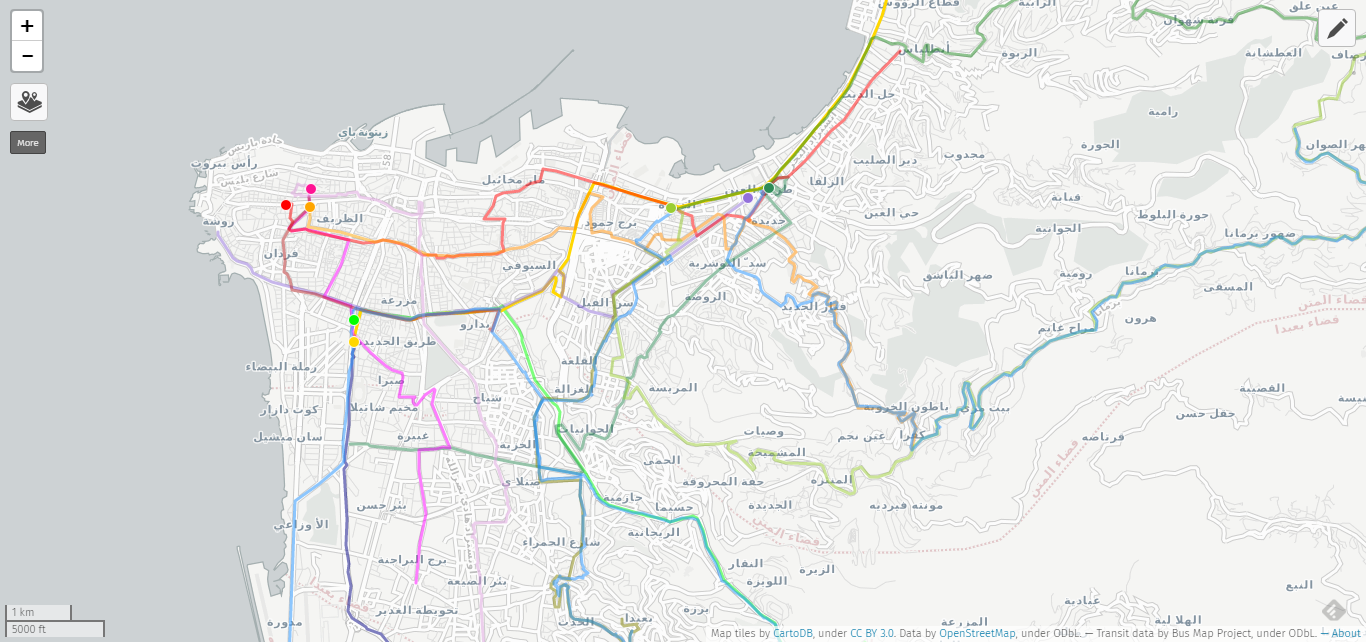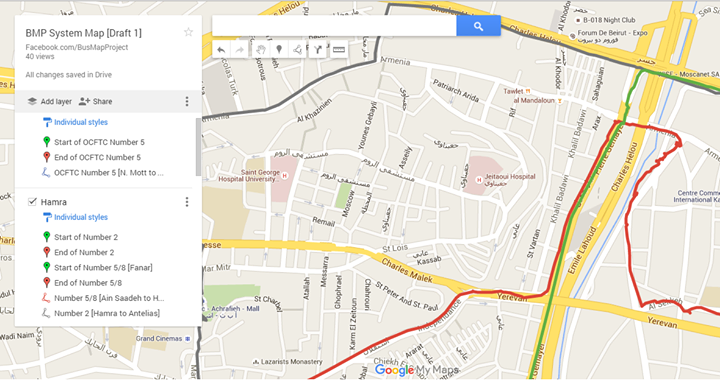“The mapping tool is just an opening for a needed change in activism. We need to advocate [for improvements in the sector] from the point of view of a bus rider.”
Thanks for the feature, al-Monitor!
“The mapping tool is just an opening for a needed change in activism. We need to advocate [for improvements in the sector] from the point of view of a bus rider.”
Thanks for the feature, al-Monitor!
“Using the numbered buses has taught me a lot about the culture, the people, the streets and life in Lebanon. I just wanted to commend you on this initiative and wish you all the best! Beirut is most definitely #BetterByBus ❤”
“Though it sounds trivial, one of the main reasons the middle-class has notoriously avoided using Lebanon’s bus system is simply a matter of labels and maps. Where does this one go? Where are the bus stops? [..] What’s admirable about Lebanon’s millennials is that they aren’t naive to expect too much from public bodies and tend to proactively find alternative solutions.”
Thanks for the feature, Bananapook! <3
It’s interesting to reflect on the pragmatism that motivates us at a time when there’s a real chance that the same can-do spirit might make public policy more welcoming of our generation. Our vote is with all of you hopeful people. Good luck to us all!
There’s been a lot of activity on a Twitter hashtag about the bus in Lebanon that we initiated the other day. We’ve noticed much sarcasm, but also, quite a few good insights and ideas — what do you think?
Title : 3a beirut – A film about the perception of a guy coming from the bekaa to beirut. He is waiting for the bus that will take him to his dream city, wondering if it will as expected…
Check out this clever portrait of unequal development and the importance of access to public transport in Lebanon.

Good morning, Beirut! It’s still pretty messy, but it’s getting there!
Here’s a sneak preview of our first, ten, mapped bus routes!
We tracked these using LiveTrekker and Gaia GPS, and dumped them raw onto Google Maps. The routes will need to be cleaned up and labelled (and there’s a lot more coming!) but it’s fun to see the system start to take (some) shape and make (more) sense.

Live outside of Beirut? Want to help us track more bus routes? Yalla!
We’re excited to share this documentary by our friend Nora Niasari, now available to view online! Production of this short film on Beirut’s public transport began in 2010. In 2011, “Beirut, Under the Bridge” was awarded ‘Best Director Documentary’ and ‘Special Jury Prize Documentary’ at the 11th Beirut International Film Festival, and was broadcast on CNN and MTV Lebanon.
We asked Nora to reflect on her project, nearly six years on: “For me, Beirut is a city of unspoken potential. In 2010, our film stirred up a mostly dormant debate about public transport, asking why the sector was effectively buried alive after the civil war. We learned many things, but today, transport workers and transport users alike are still asking, “Where are we headed?”
Read more about Nora’s experience here.
Citizen Consultation Lebanon is an interesting initiative addressing civic rights and needs from a grassroots perspective, including the right to public transport, as seen in this legal briefing. Have a look to learn more about the root causes of the traffic crisis we are facing today, and make sure you also check out Legal Agenda’s earlier briefing (in Arabic).
At the same time, we would like to point out how little attention the existing transit network is given in such documents. This is a common issue; most people working on transport/transit in Lebanon have a very good idea about everything the state has failed to do, or has done badly, but the elephant in the room — the complex networks of people and places filling the gap left open by state neglect and mismanagement — is consistently ignored, downplayed, or put to one side.
We believe that the existing transit system is more than just a lack (“UNregulated,” “UNorganised,” “INefficient,” etc), a mistake, or an empty placeholder for something yet to come. It’s also more than a de facto reality we must contend with in order to promote change — it is a network of citizens just like us. Time to start talking.
As 2015 starts making its exit, and the various ‘Year in Review’ posts begin to proliferate, we are excited about what’s in the Bus Map Project pipeline in the coming months. We are buzzing with ideas and have several threads to follow up on after the holiday season, so this is a great time to reflect on the project so far.
Our modest proposal emerged during one hot summer of great anger and great hope in Lebanon. We have been insisting on doing things a little differently from what we’re used to, and it has been very encouraging to see positive and enthusiastic responses from the people we’ve met and interacted with along the way. It appears that the need for new approaches to incremental urban change is something that others can easily recognize—so, thank you! Thank you for coming along for the ride.
Since our ‘soft launch,’ we have enjoyed letting the project morph and adapt according to the connections we’ve made. In the coming weeks, we will be drawing on what we’ve learned to develop an action plan for 2016: to widen the circle of participation in the mapping process, and develop specific areas of focus based on the partnerships we’ve formed. We invite you to get in touch with us if you have any thoughts or concerns, want to work directly with us, or simply feel like a chat.
And of course, we will be updating you about our recent activities: what’s up with that bus route in Ghosta? What was the most popular route mapped by participating student-designers? How can you join our emerging ‘citizen design’ team? Answers to these questions and more will be coming soon.
For now, we wish you happy holidays!